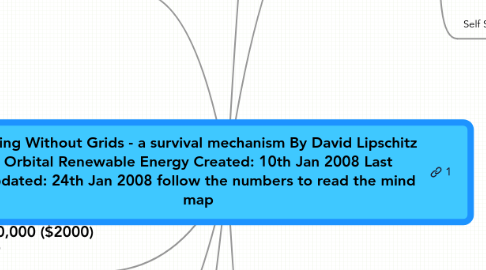
1. What can I do immediately at no cost?
1.1. Switch off all applicances at the wall when they aren't in use
1.2. Don't use more than one "power hungry" appliance at the same time!
1.2.1. eg: only use one of toaster, kettle, iron, washing machine, hob/oven, lawn mower, at a time
1.2.2. this will reduce the "peak demand" that power stations need to supply and thus dramatically reduce the need for new power stations in the next decade
1.3. Stop waiting for the government to do it for you!
1.3.1. Every time the government does something for you they either borrow money which you need to repay or they find a way to raise taxes. You pay for it in any case - and government gets to choose where your money goes and who benefits. You can have a direct role in reversing this process.
1.4. Recycle everything you can so that you don't drain the environment
1.5. Find out everything you can and volunteer in your local eco-village. If one doesn't exist start one!
2. If I have R20,000 ($2000) what can I do?
2.1. Install a solar panel system to run your "critical loads", eg your lights or your home computer, radio and/or TV system
2.2. Buy a "worm farm" and recycle your organic waste
2.3. Replace your fridge(s) with an AAA or A+ or a fridge that is graded "green" by the Dept of Energy and Industry
2.3.1. 130 to 185 Watts when running
2.3.2. But only for 15% to 20% of the day at 24 Celsius and 60% stocked
3. If I have R200,000 $20,000, what can I do?
3.1. Everything in the free section above plus:
3.2. Take as much of your house off the electrical grid that you can
3.3. Investigate a water tank
3.4. Investigate a bio-ingestor
4. I am a billionaire (or I feel like one) - what should I do?
4.1. Everything in the free and R200,000 sections above plus:
4.2. Take your house and all your other assets off grids
4.3. An inexpensive way to do this might be to finance a wind farm
4.4. Get your name associated with green projects
5. The Grids
5.1. Electricity
5.1.1. known as "living off grid"
5.2. Water
5.3. Sewerage
5.4. Cooking (Gas)
5.5. Food
5.6. Waste
5.7. Transport
5.8. Money
5.9. Community
5.9.1. We want to be off all the other central grids; and on this grid
6. How
6.1. G-d has given us ample resources which we can destroy or use to make electricity at no cost
6.2. There are techniques to cheaply turn sea water into fresh water. We can tap into the Cape Town aquifer.
6.3. Septic tanks and bio-ingestors mean that we can localise our sewerage and 3 people's sewerage creates enough gas for cooking & heating
6.4. Home grown food is possible. "Blanch and Jar"; Store; Granny & The Bible.
6.4.1. Hydroponics where sand is scarce or difficult to grow in
6.5. Recycle to preserve nature and the environment
6.6. Barter
6.7. Self Sufficient Communities
6.7.1. Little self sufficient communities like a Middle Age Rural Community
6.7.1.1. eg with Miller
6.7.1.2. Iron Worker
6.7.1.3. Baker
6.7.2. Village surrounded by farmlands
6.7.2.1. Farmers Market
6.7.2.2. Agricultural Base
6.7.2.3. Villages Supported This
6.7.3. Put this into a more modern context - being resource efficient
6.7.3.1. Use technology to work from home
6.7.3.2. Communications grids will be and stay essential
6.7.3.3. More locally sourced food, available in season, not all year around
6.7.4. In our modern world
6.7.4.1. Centralised
6.7.4.1.1. People travelling large distances to work, shopping, leisure
6.7.4.1.2. Adds to pollution
6.7.4.1.3. No quality of life - especially of people stuck in traffic jams
6.7.4.1.4. Are large cities going to be sustainable in the long term
6.7.4.1.5. Our food stuffs have big logistics where everything is frozen, transported, warehoused, over large distances
6.7.4.1.6. The big supermarket concept where some food is imported and where there is a centralised refrigerated energy hungry food store
6.7.4.1.7. Why do children need to "go to school". With Facebook and all the other social networking tools and with ADSL2 fast speeds, why can't shool take place at home. The kids can play with other children in their neighbourhood.
7. Why?
7.1. It's the right thing to do
7.2. Man's effect on weather and the environment is real
7.2.1. "An inconvenient truth" (Click on the arrow)
7.3. We cannot keep taking; we must start giving (putting back).
7.4. Success should be measured by "living off grids", ie living without grids, rather than whether you have a fancy car or a watch or jewellery or a holiday house
7.4.1. The success "paradigm" with which we have lived since the industrial revolution must be changed. Help it to change from a materialistic one to a "living off grids one"
7.4.2. Why does there need to be a "Cost of Living?"
